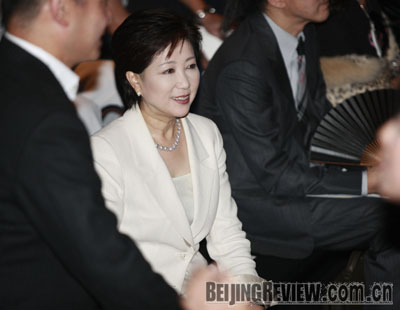|

THE FASHION CANDIDATE: Former Defense Minister Yuriko Koike attends a fashion
show in Tokyo on September 5. Koike is the first woman to seek the Japanese premiership
Japanese prime ministers rarely last more than a year or so, and Yasuo Fukuda is no exception. When he announced his resignation on September 1, he had completed 11 months in office.
Now that Fukuda has stepped down, the ruling Liberal Democratic Party (LDP) will elect a new party president on September 22. The winner will face significant challenges as the next prime minister.
No surprise
Most media reported Fukuda's resignation with words like "sudden" and "lightning," because there had been no signs he planned to step down. Days before his resignation, Fukuda announced a $17 billion stimulus package to shore up Japan's flagging economy.
Critics pointed out that the Fukuda cabinet had long been under great pressure, which made his resignation somewhat inevitable. Japan's complicated political structure, its economic slump and scandals within the LDP doomed Fukuda, 72, to a frustrating premiership.
At a hastily arranged press conference, Fukuda said he wanted to announce his resignation before the next legislative session begins. "I judged that now is the best time to resign in order not to create a political vacuum," he said.
Fukuda never really found his footing after he took over from Shinzo Abe last September. Abe also resigned after less than a year as prime minister.
Jin Xide, a senior researcher on Japanese studies at the Chinese Academy of Social Sciences (CASS), pointed out in a Global Times report that low public support for the Fukuda cabinet contributed to the prime minister's resignation. In the last several months, the cabinet's approval rating had dipped below 30 percent.
"The declining economy is the root of the crisis in confidence," Jin said. Although Fukuda made significant diplomatic achievements, especially in China-Japan relations, Japanese voters have been more concerned with the economy. Since Fukuda came to power, the international economic situation has not improved as expected. Japan has suffered from the U.S. subprime mortgage crisis, along with rising food and fuel costs. The Fukuda administration also lost support over a health insurance plan that would create a greater financial burden for Japan's growing elderly population.
| 